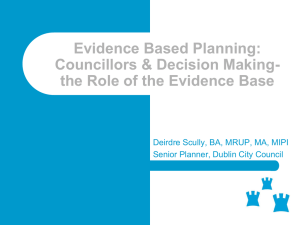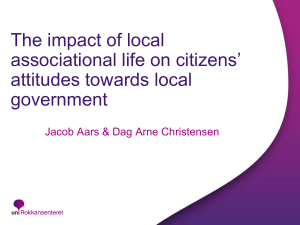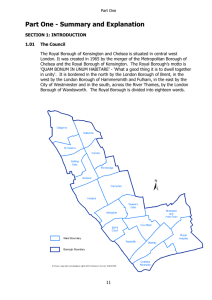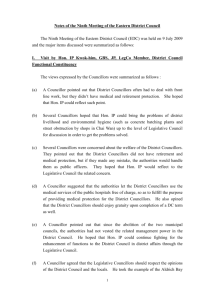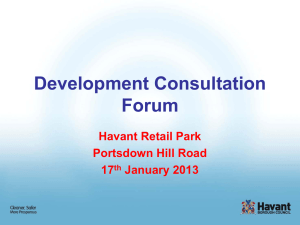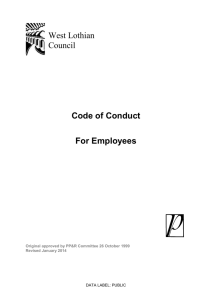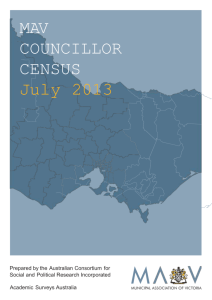Influencing Policy - Presentation by Brian Harvey
advertisement
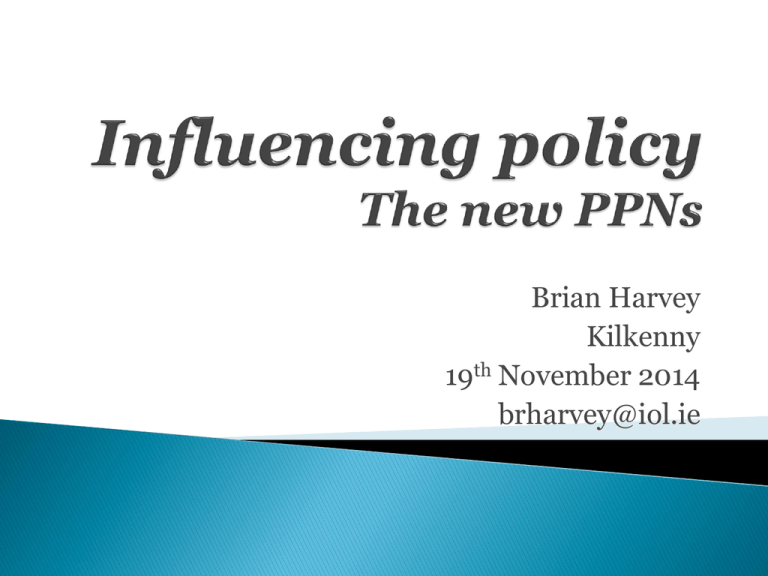
Brian Harvey Kilkenny 19th November 2014 brharvey@iol.ie Influencing policy, from local to national: principles and key steps ◦ See Working for change How to use local government effectively Experience of representation: how to use ‘the place at the table’ effectively Being accountable Making PPN (SPC, LCDC) experience work Voluntary and community organizations can be effective in using local, national political mechanisms to influence policy, resources, practice: ◦ Working with councillors, deputies, senators, MEPs ◦ Working through government departments, state agencies (bilateral engagement) ◦ Getting places on decision-making bodies ◦ Using media, publications ◦ Some also use direct action ◦ Many work in coalitions (multi-lateral engagement) Permeable ◦ Relatively easy to meet politicians, officials ◦ Premium on skills to build up informal relationships Accessibility of information ◦ Good volume, quality at national, governmental level ◦ Premium on NGO skills in searching, sharing Problem of secrecy, transparency ◦ How much of local decisions is shared?! What’s not there. Smaller, weaker civil, public service: ‘incompetent state’ Limited concept of consultation ◦ Mono-dimensional: ‘send us your submission’ (over) A public notice must be published inviting people to make submissions or observations in writing. The steering committee must prepare a report on these submissions. Defining the issue, ‘what the problem/issue is’ Getting it on the political agenda Shaping a local/national government response: solutions ◦ Coming up with solutions is our responsibility Implementation This requires: ◦ Knowing what issues you want to get across, ability to define them, write and talk about them ◦ Knowing what the political system can do about them (or not) ◦ Knowing who is being asked to do what ◦ Knowing what the solution will look like? ◦ Setting up systems of implementation, checking that it is done (and who does so, how) New behaviour: cycle ways, library bus, speed bumps Ceased behaviour: no-warning evictions New spending priorities: solar panel grants; insulation schemes, reduced tax low-emission cars; community trust Stopping behaviour: incinerator, housing (DCC), pylons, anti-cycle notices Consulting people who weren’t consulted before: Ballymun Community Facilities Forum, homeless forums, HSE consultative forums ‘Raising awareness’ is not changing behaviour! Once you change who decides the policy, you change the policy itself - - Slovenian NGO Examples: SHRAC, working group direct provision, prison strategy group, Keane report Assumption: change from inside possible Governments need solutions to problems ◦ Convince them it’s part of their agenda too ◦ Which means familiarity with policies of national, local government Wish to be seen to be responsive ◦ Do not want to be in perpetual stand-off It becomes more expensive to continue current policy than to change: tipping point is reached (e.g. water charges) ◦ Not always clear which intervention is decisive Champions run with issues (public servants, elected reps) Country likes to be seen as modern, progressive, up to date, internationally in line, so do local authorities ◦ e.g Age-friendly county, Louth. ◦ Dun Laoghaire processes community consultation (SPAN) Good time, with new councillors 2014 Responsibilities ◦ Planning/development plan; roads, housing, recreation, amenities, libraries, water, sewers, environment ◦ From 1996, ‘community’ functions, SPCs ◦ Important to know what they can and can’t do ◦ What manager can do (reserved functions), councillors ◦ But limited powers, limited funds (rates, LPT) Importance of manager, mayor (annual), cathaoirleach. Do you know them? Introducing yourself to the key people But well-established circles of power of officials, councillors, state agencies, businesses don’t like disruption. Meet monthly. [Who here has been?!] ◦ Kilkenny, 3rd Monday of each month Formal decisions e.g. Development plan ◦ ◦ ◦ ◦ Question manager, debate motions, take presentations Anyone may attend, with ticket from councillor + press You could ask for your own press pass Role of functional committees (councillors only) Staffing hierarchy: ◦ Directors of services e.g. Environment, housing, planning ◦ Professional staff e.g. engineers, executive officers, administrative officers How familiar with publications, products? ◦ www.kilkennycoco.ie, IPA Yearbook Question manager By letter Formally at council meetings, ‘send for a report’ Ask for opportunities for you to make presentations Motions Approve, amend development plan Write letters for you Get you access to managers, officials Advice and contacts Raise issues inside their parties Some will be interested to champion particular issues Note: they are replaced by nomination, not by-election All must have SPCs: most have 3 to 5 ◦ Titles: development & planning; environment; transport & infrastructure; education & heritage; housing, social & cultural. Led by Director of Services. ◦ One third must be community. Meet 4-5 times/year. ◦ Expected to involve voluntary, community organizations and promote social inclusion. Access to officials, other state agencies ◦ ‘Secondary gains’ Opportunities for representation, presentations, engagement, but some experienced difficulties (later). Provides an opening, but does not shift balance of power in local authorities ◦ Gains may be secondary rather than primary e.g. access ◦ Deals with lowest level of citizen participation pyramid You could put in a lot of effort for little evident gain ◦ Need to make assessment of value, participation Critical success factor: secretariat ◦ Rules of engagement? Efficient? Facilitative? Open-door? ◦ Resource worker? Well-being plan provides opportunities for important aspirational statement with substance ◦ So does community part of LECP Why do you want to be there? ◦ ◦ ◦ ◦ Change policy/practice/funding/priorities? Influence decisions further up the chain? Access officials? Accountability Where do you want to be in 1/3/5 years? ◦ What would you like it to achieve by then? What specific impact can I make? ◦ One specific, selected area to make a distinct impact ◦ Have a participation plan Problems ◦ Issues over NGO selection ◦ Meetings short, infrequent ◦ Agendas decided by local authorities, secretariat No obvious place for NGO intervention ◦ Domineering, hierarchical approach by officials, councillors ◦ Documentation late, technical ◦ Decisions not minuted, followed up: recommendations ‘ran into the sand’ ◦ Important decisions made by others, between meetings ◦ Most participants are older men familiar, confident with using authority, procedure and negotiation, may not welcome disruption to well-established ways of doing things. Found them good for: ◦ Access, information, allies But they did not challenge: ◦ ◦ ◦ ◦ ◦ ◦ ◦ ◦ Standing orders Lack of follow-up, recording issues Agendas and priorities therein Unexpected, invited presentations and their focus Frequency of meetings Bad behaviour e.g. late documentation Decisions between meeting, not reaching meetings No instance of bad behaviour ever censured Why not? ◦ Deferential? Knowledge of rules and procedures? Did not have regulations? Wanting to be loved? Standing orders/rules of procedure ◦ Opportunity to agree/disagree/amend? Agenda? ◦ And where your issues are taken Frequency? Issues between meetings Where do views/findings go? What happens? Transparency ◦ Are proceedings recorded, published? Committees can be a positive experience with productive outcomes, with a clear plan. If they are frustrating, analyze why, devise plan to address the problems. Knowledge procedure, functions, rules Mastery of own issues Read documentation (critically) Get there early; greet, introduce self to others Don’t sit in group: ‘diamond’ the meeting (Nixon) Be prepared to challenge bad behaviour, esp. at start ◦ Be prepared to vote against, require objections noted Allocate time for meetings ◦ The after process important too, checking things are done. ◦ Get to all meetings. Complain if they are changed and you can’t go. Need for combination of: ◦ Personal skills ◦ Knowledge, policy, ‘book’ skills Accountability: ◦ Minutes of meetings ◦ Regular written communications (mailing list) ◦ Regular face-to-face meetings Reporting, checking back, making oneself open to challenge Effective engagement likely to depend on: ◦ Knowledge of key documentation ◦ Making yourselves experts issues brought through by voluntary, community organizations, solutions, what-can-be-done within local framework ◦ Working with councillors, officials: person-to-person skills ◦ Meeting skills, being prepared to challenge and complain ◦ Attention to detail: mailing lists, records, how to write letters, ‘sweat the small stuff’ ◦ Complementary strategies with councillors, local media ◦ Changing our behaviour too: finding the time for getting, reading and sharing information, meeting officials, representatives, attending committees ◦ Systems of accountability ◦ Thank you for your attention!
